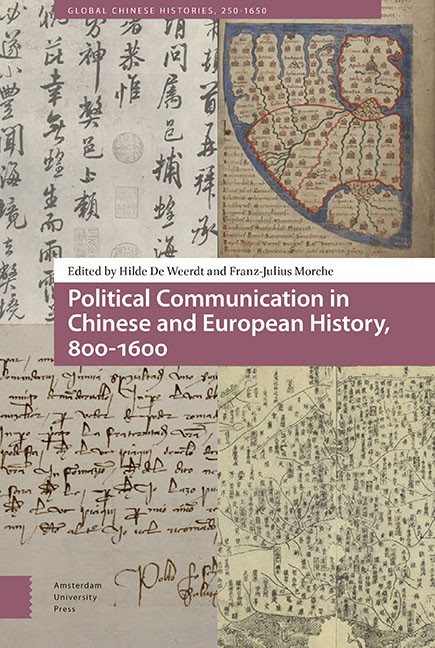Book contents
- Frontmatter
- Dedication
- Contents
- List of Figures and Tables by Chapter
- Acknowledgments
- Introduction
- Part I Communication and the Formation of Polities
- Part II Letters and Political Languages
- Part III Communication and Political Authority
- Part IV Memory and Political Imaginaries
- Epilogues
- List of Contributors
- Index
4 - Political Communications, Networks, and Textual Evidence: A Cross-Cultural Comparative Approach to Written Sources using Letter Collections
Published online by Cambridge University Press: 17 June 2021
- Frontmatter
- Dedication
- Contents
- List of Figures and Tables by Chapter
- Acknowledgments
- Introduction
- Part I Communication and the Formation of Polities
- Part II Letters and Political Languages
- Part III Communication and Political Authority
- Part IV Memory and Political Imaginaries
- Epilogues
- List of Contributors
- Index
Summary
Abstract
This chapter proposes a method for the comparative analysis of political communications which is potentially applicable to different languages, cultures and political structures. Political communications are defined not in relation to culturally pre-determined categories of relationships (allies, clients, friends, etc.), but as individual interactions or transactions between actors which have specific functions at specific times. The concept of ‘communicative function’ is proposed as the basis for the profiling of relationships, which is in turn the basis for a culturally neutral comparative analysis of political communications. Examples are given of the application of this methodology to a number of Western medieval letter collections, an important source of evidence for political communications and networks, along with suggestions for future directions of research.
Keywords: communicative function, transactions, relationships, networks, letter collections
Political communications are the detectable components of the networks which historians now increasingly see everywhere as the substrate of human societies and as shaping forces in polities. They are the manifest interactions and exchanges which can be visualized as the nodes and vectors of social or political networks which in turn are emerging as an important explanatory model for group formation, influence, common action, trust-building and many other forms of political activity up to the level of state formation. While networks themselves are not substantive entities, neither are they metaphors; rather, they are descriptions of abstractions which can model or visualize the complex sums of the many human relationships and exchanges which constitute political activity.
A generic concept of political communications, as of networks, offers obvious potential for cross-cultural comparative history. The communications and interactions themselves, however, are embedded in social practices, articulated through linguistic and genre conventions, and related to philosophical traditions or shared assumptions which can differ between cultures to the point of apparent incompatibility. Where, for example, China's famously enduring examination system was founded on the belief that mastery of the written word corresponded to mastery of truth and to ethical purity, the ancient Western tradition of rhetoric took as equally axiomatic the exclusive authenticity of the spoken word and the indirectness or dissimulation of the written. How can any comparative study of texts cross so fundamental a divide even before we take into consideration the different linguistic and genre conventions, social hierarchies, or religious and political institutions, and the ever-changing historical contingencies of times and places, as well as the practical experiences of individual actors?
- Type
- Chapter
- Information
- Publisher: Amsterdam University PressPrint publication year: 2021



